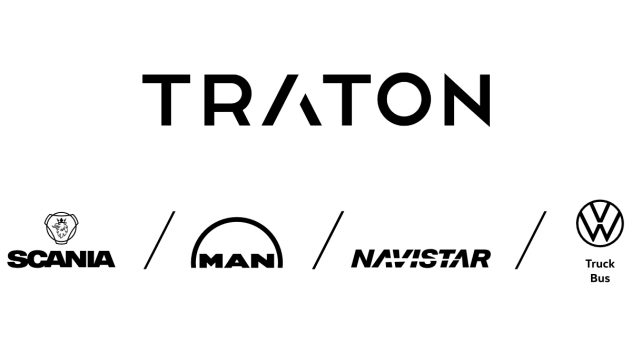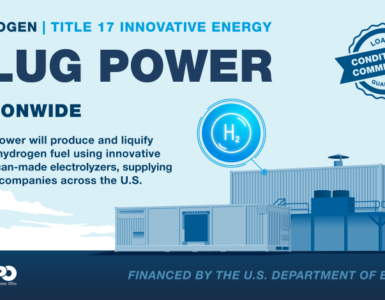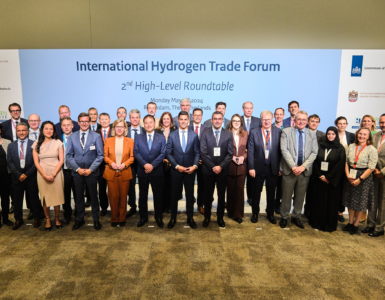Traton SE: Disregarding hydrogen fuel cell technology is a risky bet.
As far as trucks are concerned, the eventual demise of the internal combustion engine is all but certain. Recently, that was underlined by the California Air Resources Board’s (CARB) adoption of new regulation effectively banning diesel trucks from 2036 onwards.
Experience suggests that as California goes, so eventually goes the nation. At the same time, there are proposals for EU legislation with similar effects – albeit with a slightly less ambitious time frame.
While there is little doubt, that the future will belong to zero-emission vehicles, it is less clear which technology will prevail. There are two different concepts: battery electric vehicles (BEV) and hydrogen fuel cells. Both have distinct advantages and disadvantages, respectively.
🔥 What about we co-host a webinar? Let's educate, captivate, and convert the hydrogen economy!
Hydrogen Central is the global go-to online magazine for the hydrogen economy, we can help you host impactful webinars that become a global reference on your topic and are an evergreen source of leads. Click here to request more details
Traton SE (OTCPK:TRATF), Volkswagen AG’s (OTCPK:VLKAF) separately listed truck and bus division, is fully committed to the BEV concept. I believe that the decision to disregard hydrogen poses considerable risks for the company as a whole in the long run.
The Case For Hydrogen Trucks
First of all, let me briefly point out why I believe hydrogen fuel cell to be a crucial technology for truck manufacturers going forward. Nikola Corp. (NKLA) did the concept a huge disservice with their phony demonstration of the alleged capabilities of its Nikola One prototype – which turned out to be powered entirely by clean zero-carbon gravity, so to speak.
Nonetheless, there are certain conceptual advantages of the technology as compared to BEVs. Fuel cells are lighter, thus allowing for a higher payload. From an operator’s point of view, the calculation is remarkably simple: less weight = higher payload = higher pay.
At the same time, fuel cell technology allows for charging times similar to diesel-powered vehicles, while a battery takes considerably longer to charge for a considerably lower maximum range per charge.
EU regulations stipulate mandatory breaks of at least 45 minutes every 4 hours of operating time. If a vehicle’s battery may be fully loaded during this time, a maximum range of about 400 km would be sufficient for most (legal) use cases. Notably, Traton itself bases its case for BEV trucks explicitly on these rules.
However, the regulatory environment in other jurisdictions is less strict. For example, the American DOT requires a 30-minute break after 8 cumulative hours of driving. Going forward, increased autonomous driving capabilities (and regulatory adjustments) may allow for even fewer/shorter breaks and thus lead to increased value of range per charge.
Also, the longer charging time increases the risk of “clogged” charging points, especially on routes with high traffic. The worst case imaginable would be that all charging stations are occupied at the start of a mandatory break. For fuel cell or combustion-powered vehicles, this would result in a few minutes’ worth of delay. In the case of BEV trucks, on the other hand, this may easily cost up to a tenth of daily on-duty time (based on the US DOT’s 14-hour rule).
Furthermore, the range of fuel cell-powered vehicles is less susceptible to temperature. Predictability and reliability are paramount for a low-margin business such as trucking, as calculations must be precise to ensure profitability.
As rightfully pointed out in an analysis of German researcher Patrick Plötz of Fraunhofer ISIS (which Traton almost enthusiastically quotes), total operating costs are the most important factor in commercial trucking. As of right now, the cost per kilometer/mile is considerably higher for a fuel cell truck compared to a similarly sized BEV. However, I believe that the balance is likely to shift in favor of hydrogen in the not-so-distant future.
First, hydrogen – like gasoline – can be transported relatively easily. There are places like Saudi Arabia or the UAE that pair almost ideal conditions for large-scale production of hydrogen (most importantly the potential for virtually unlimited cheap solar/ wind energy) with existing transport infrastructure that would be relatively easy to convert for the transport of hydrogen.
At the same time, the US DOE’s National Clean Hydrogen Strategy aims to reduce prices for Made in America hydrogen to about $1 per kilogram within a decade.
While it is a simple fact that the system efficiency of hydrogen is considerably lower than that of a BEV concept, this does not matter – not economically, anyway – provided the production and transport of the hydrogen are cheap enough compared to local sources of electricity. After all, the system efficiency of diesel/gasoline engines is even lower.
As for the higher unit cost, I would expect that with increasing production economies of scale are likely, thus closing or at least narrowing the cost gap to BEVs. This in turn may even increase the attractiveness of fuel cell vehicles for use cases which otherwise would be more naturally suited for BEVs in terms of pure technology considerations, depending on the respective local cost of electricity.
So, all in all, while for short haul trucking as well as public transport and last mile BEVs are certainly the superior concept, there are use cases better fit for the hydrogen fuel cell technology. Even under the assumption that the European market would tend to be BEV-leaning for reason such as energy autonomy, I think the case can be made, that hydrogen models will be crucial for the American (long-haul) trucking market.
A Risky Bet
Under this assumption, Traton is taking a major risk given its product mix and geographic exposure. Well over 80 percent of Traton’s unit sales are trucks (2022: 254,300 trucks out of 305,485 total units). I imagine the segment’s share of revenue to be in the same ballpark percentage-wise, as I assume trucks sell at considerably higher average unit prices compared to light commercial vehicles but are cheaper than buses.
North America (ex-Mexico) accounts for about a fifth to a quarter of Traton’s truck division’s unit sales. In 2022, the company generated 21 percent of total revenue in the US, thus making it Traton’s most important single-country market. Notably, the US market is almost as important as the second and third largest markets – Brazil (12 percent) and Germany (11 percent) – combined in terms of revenue.
And Brazil is a country with long distances and an electricity grid vulnerable to supply shortages given its massive reliance on hydroelectric energy generation. From my point of view, this speaks for additional incentives to choose fuel cell vehicles over BEVs there too.
Rivals such as Paccar Inc. (PCAR), Daimler Truck Holding AG (OTCPK:DTGHF;OTCPK:DTRUY); Iveco Group NV (OTCPK:IVCGF) and the truck divisions of Hyundai Motor Company (OTCPK:HYMTF) and Volvo Group (OTCPK:VOLAF) all invest heavily in the development of hydrogen trucks.
Paccar cooperates with Toyota Motor Corp. (TM), who have been a pioneer in the use of fuel cell technology in passenger cars. Toyota plans to begin commercial production at its Georgetown, Kentucky plant later this year. Hyundai’s Xcient truck meanwhile is already commercially available.
Younger companies such as the aforementioned Nikola should not entirely be written off either. Notably, existing fleets could – at least in theory, commercial rather than technological viability being the main hurdle – be retrofitted with a fuel cell. A similar conversion to a BEV layout would be considerably harder due to the physical size and weight of the necessary battery packs.
At the same time, all major rivals have BEV trucks on offer as well. It is not as if Traton would be the only company offering BEV trucks if the concept were to prevail. Nor is their BEV product mix vastly superior. Traton is merely the only player exclusively relying on the concept. Everyone else has both. Even if the company were to shift course at some point, it would enter the market at a considerable disadvantage.
Meager Return
The cost saved by not developing fuel cell vehicles does not outweigh these risks in my opinion. For comparison: Traton’s R&D spending (2022: €1.89 billion, Q1 2023: €520 million) are higher than those of Daimler Truck (2022: €1.79 billion; Q1 2023: €440 million), a company not only considerably larger in terms of unit sales (Traton: 84,587/ Daimler Truck: 125,172 as of Q1 2023) and revenue (€10.94 billion/€12.58 billion as of Q1; both excluding financial services) but also developing BEV and fuel cell technology in parallel.
The adjusted Q1 operating margin of the respective industrial businesses is very similar as well (Daimler Truck 8.8 percent/Traton: 8.4 percent). I am using Daimler Truck as a comparison, as both companies report in Euro and are standalone truck and bus companies with similar product lineups. Other competitors are either parts of integrated groups (such as Volvo Truck and Hyundai Truck) or more specialized (such as Paccar).
While Traton does not break up R&D spending by brand, I assume that there is still some synergy potential left, especially between MAN Trucks and Scania. Historically, the two brands and their respective management and development teams have had a reputation for internal rivalries leading to unnecessary “engineering competitions” within the group.
That kind of competition between sister brands has long been a particular feature of the parent Volkswagen group as well. But even factoring in the aforementioned potential, the lack of hydrogen R&D seems not to lead to meaningfully higher profitability compared to Daimler Truck (let alone Paccar which is in another league altogether in that regard with solid double-digit margins). Furthermore, Traton had €7.2 billion as of March 31st compared to Daimler Truck’s €7.5 billion net liquidity as of March 31st (both figures ex-financial services).
Conclusion
All in all, I think that Traton’s decision not to develop fuel cell vehicles is extremely risky in the long term. The company could lose its share of the long-haul trucking market in the US, if not globally, if and once hydrogen proves the more competitive technology. That would materially impair both revenue and profitability.
At the same time, this strategy does not seem to lead to materially higher profitability at present compared to direct competitors. Neither do appear Traton’s BEVs to be significantly superior.
So even if I am wrong about hydrogen, and BEV (or even the likes of synthetic fuels or hydrogen combustion engines) will be the prevailing concept, that does not mean that Traton will be the only game in town. They merely would not lose market share in that scenario. All in all, Traton is the only large truck manufacturer that does not invest in hydrogen fuel cell R&D while at the same time being more indebted and not significantly more profitable than competitors.
Due to the reasons lined out above, I believe that Traton is among the less attractive truck manufacturers from an investment point of view. While it is certainly hard to predict a specific time frame, I believe that hydrogen is likely to play an important role towards the end of the decade.
This notwithstanding, I could very well imagine that the market will become more aware of the risk Traton is taking earlier given the increasing attention that hydrogen as a source of clean energy is drawing, not least due to massive government subsidies such as the American IRA and the EU “hydrogen accelerator“.
Without hydrogen trucks, I assume that the company is not unlikely to lose between 20 and 33 percent of its business in terms of revenue and a disproportionately higher share of profits (due to hydrogen being most interesting for vehicle classes that tend to generate the highest margins).
Considering that the stock currently trades at similar multiples compared to Daimler Truck – which also has a stronger balance sheet – I think that a discount of at least 15 percent would be warranted. This would translate to a stock price of around $18.
Editor’s Note: This article discusses one or more securities that do not trade on a major U.S. exchange. Please be aware of the risks associated with these stocks.
Highlights:
- Traton SE is the only large truck manufacturer not developing hydrogen fuel cell technology.
- That is a risky decision, as hydrogen has significant advantages vis-a-vis BEVs.
- Despite not spending on hydrogen R&D, Traton is not significantly more profitable than its competitors.
- Traton’s BEV trucks are not significantly superior to other manufacturers.
- All in all, the company has little to win if it is right about hydrogen and much to lose if it is wrong.
READ the latest news shaping the hydrogen market at Hydrogen Central
Traton SE: Disregarding Hydrogen Fuel Cell Technology Is A Risky Bet, May 26, 2023








